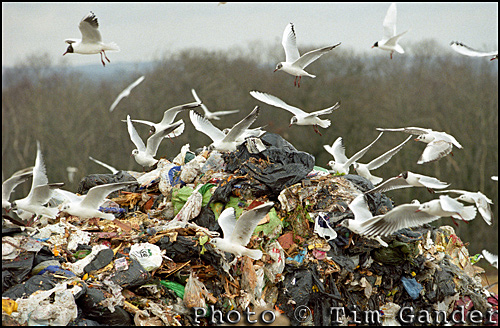
Seagulls can't eat cameras. Their apertures are too small.
The response to my post “How Green is Your Photography?” was pretty interesting, and highlighted some useful resources for photographers wishing to take a less Magenta approach to their work (rubbish, nerdy in-joke. Sorry).
So what’s to do with this environment thing and photography? I suppose we could all just stop taking pictures and have our cameras turned into ploughshares. Small, rubbish ones, but once you melt a camera down, there aren’t many things it’s good for. When it comes to Samsung cameras, you don’t even have to melt them down to achieve “useless” status.
I started this subject because some time ago I’d been pondering the issue of the environment and how photographers might do their bit, bearing in mind that what we do isn’t exactly eco-friendly. Then I bumped into Chris at Park Lane Press Limited, which is based near me, and he showed me the waterless lithographic printing facility they have at their Corsham plant. I was impressed that the print quality, even on difficult, recycled paper stock was at least as good, and often better than I’d seen on the same papers using traditional printing methods.
This system is perfect for commercial clients wishing to use a more eco-friendly approach to brochure and annual report printing, but it also got me thinking about eco-friendly printing for photo prints. A chance comment from Rick Colson of EcoVisual Communications in Wayland, Massachusetts (who use post-industrial cotton waste papers) on one of my other articles got me thinking there must be eco-friendly photo printers in the UK too, though an internet search didn’t throw up any obvious candidates. So if you know of a truly eco-friendly photo printer in the UK, do let me know. Not just one with the word “eco” shoehorned into their mission statement.
Comments to my previous article suggested ways we can be more considerate in our use of energy, materials, photo and computer equipment. One respondent had seen an article in which a macro photographer glued ants to a twig to get a better closeup. Perhaps not the eco-crime of the century, but I’d hate to see this practice extended to lions, tigers and pandas. For a start, the amount of glue required to stick a polar bear to an ice floe would certainly be environmentally problematic.
I’ve made some simple conclusions, but feel free to add your comments. I’d like to update the article with useful links once I have a few more.
I’m ambivalent about transport. Use public transport where possible, but personally that isn’t often feasible, at least in the UK. Changing your car for something “greener” will cause more harm than good as most of the environmental impact of running a car is in its manufacture. Simply try driving more considerately. This will save fuel and wear and tear.
Rechargeable batteries are so much better than they used to be, so there’s no excuse for creating a mountain of spent alkalines any more. Try charging at night, perhaps using a timer socket so you’re not charging them all night. Power drawn at night uses electricity that would otherwise be dissipated and wasted.
Eek out your kit. Don’t keep upgrading. Spend more on kit that lasts longer. I’m not a cheerleader for Apple, but my MacBook Pro is over two years old and going as well as the day I unpacked it. Most PC laptops are getting clapped out after 9 months (cue flame-grilled Timmy as the PC brigade rush to defend their honour).
Recycle and dispose of waste responsibly. Even electronics and dead batteries will be handled by your local amenity tip.
Link up with Green Photographers Network to learn more or share ideas.
And here’s one to really stir things up. I know stock images are here to stay, but I also believe that driving around, shooting thousands of photos nobody asked for and a tiny number of which will ever get published, isn’t a good way for photographers to protect the environment. Let’s not get into the issue of server space and energy required to host all those pictures of kittens and businessmen standing in fields.
Next time you need a photo of a polar bear on an ice floe, commission a local photographer to shoot it for you. Glue will be extra.
No polar bears were harmed as a result of writing this article, but the Pandaburger was yummy.



